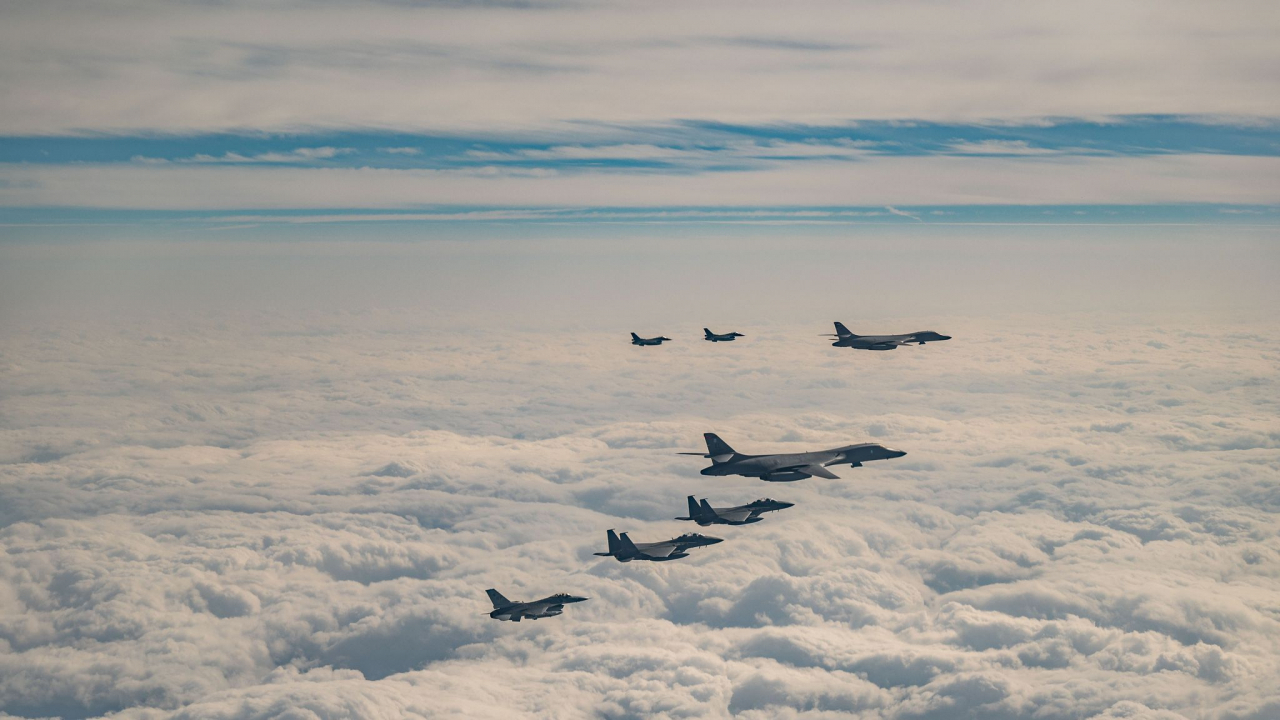 |
For the second time this year, fighter aircraft from South Korea, the US and Japan conducted a trilateral escort flight of US bombers operating in the Indo-Pacific, Dec. 20, 2023. (US Air Force) |
South Korea and Japan should work towards "normalizing bilateral defense relations through a first-ever joint security declaration" in light of the growing necessity to strengthen connections between their respective militaries, according to a report from a Washington-based think tank released Thursday.
The report titled "The US-Japan Alliance in 2024: Toward an Integrated Alliance," sponsored by the Center for Strategic and International Studies (CSIS), emphasized that the "need for connective tissue" between the South Korea-US and US-Japan alliances is "greater than ever before."
The report emphasized the significance of enhancing connections, especially given Japan's swift advancement in defense capabilities, including long-range counterstrikes. It further referenced the establishment of trilateral dialogue structures at the strategic level, following the Camp David summit in August 2023, as instrumental in achieving this objective.
"The allies should now move to establish formal connections at the operational level, including through exchanges of liaison officers at respective commands, the inclusion of observers at bilateral exercises and the establishment of a trilateral contingency planning cell," the report read.
"To support these changes, Japan and South Korea should move purposefully and promptly to normalize bilateral defense relations through a first-ever joint security declaration."
The report cited the 2007 Japan-Australia Joint Declaration on Security Cooperation as a template for South Korea and Japan to model after.
The 2007 non-binding political statement, which was renewed in 2022, initially outlined various areas of cooperation in both traditional and non-traditional security realms. These encompassed a wide range of initiatives, from disarmament and the counter-proliferation of weapons of mass destruction and their delivery systems to maritime and aviation security, as well as humanitarian relief operations, including disaster relief efforts.
The report, chaired by former US Deputy Secretary of State Richard Armitage and Harvard Emeritus Professor of the Kennedy School of Government Joseph Nye, included the participation of eight other researchers, among whom were CSIS Senior Vice President for Asia and Korea Chair Victor Cha and Vice President of the Asia Society Policy Institute Wendy Cutler.
The report also underscored that the US-Japan alliance "should consider G7 expansion to include Australia and South Korea, the world’s next two largest advanced democracies and partners that are increasingly critical to global political and economic responses."
The Group of Seven countries consist of the US, UK, France, Germany, Italy, Canada and Japan.
The report clarified that the G7 has become increasingly significant as the "primary international forum for upholding the international rules-based order, from support to Ukraine to combating Chinese economic coercion."
The expansion of the G7, described as "perhaps the only effective" global governance institution, is imperative to incorporate other like-minded partners who share values and possess resources essential for shoring up the rules-based international order.
"Given the challenges facing today’s international environment, it is time to bring additional voices with meaningful capacity and aligned views to the table," the report read. "This is not charity."







